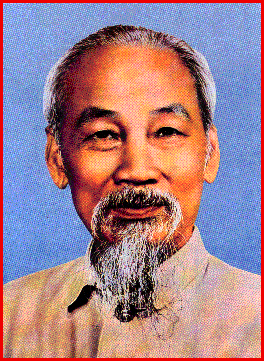


The Vietnamese have always been very traditional, very patriotic and very nervous about foreign involvement in their country. Given the repeated invasions by China and later the colonial rule of France, this is entirely under-standable. In the early days of colonialism and previously, all of the liberation movements had been traditional and monarchial in nature, from the Mandarins Revolt and Can Vuong movement under Emperor Ham Nghi, the restoration movement of Marquis Cuong De and Phan Boi Chau and the attempted up-rising by Emperor Duy Tan and Tran Cao Van in 1916. There were little other efforts of consequence until the arrival of "Nguyen Ai Quoc" (Nguyen the Patriot", who had learned the principles of Communism in France.
It is ironic that the freedom of French society, combined with their colonial rule of Indochina, would ultimately lead to their own un-doing. The traditional Vietnamese authorities and the monarchy had been undermined by their association with the French and inability to defeat these latest invaders. Yet, the French "chattering classes" were also responsible for the formation of Nguyen Ai Quoc, the founding father of Vietnamese communism. In France, communism was a drawing room party, but in Vietnam it was a tool with which Nguyen Ai Quoc could ultimately gain popular support for dictatorship.


While the emperor was entangled with French and Japanese officials, Ho organized his political movement, the Viet Nam Doc Lap Dong Minh Hoi, or Vietminh, to bring hunger relief to the starving people of Hanoi where Japanese exports and a recent famine had worked together to devestate the population at just the right time to work to Ho's advantage. This greatly added to his prestige as a true friend of the people who cared for them when others would or could not. Revolution swept the country and when Emperor Bao Dai formally surrendered the sword and seal to representatives of the "Democratic Republic of Vietnam" it seemed to many of the traditional Vietnamese that Ho Chi Minh had gained the mandate of Heaven. It also helped that he had the only standing Vietnamese military force in the country. This force had been armed and trained by O.S.S. agents of the United States military, their association with Ho Chi Minh also helped to raise his prestige in the eyes of the court. The Emperor Bao Dai felt that Ho had American support and that his association with the Japanese
Ho Chi Minh was also very careful to portray himself as a nationalist open to all "patriotic" Vietnamese. Purges in the south carried out by the Communists, including the assassination of monarchists like Pham Quynh and Nguyen Van Sam, were officially condemned by Ho Chi Minh. He spoke of welcoming all people into his government and even gave the former Emperor the title of "Supreme Advisor" to the new Democratic Republic of Vietnam. When people's courts began to round up landowners and massacred thousands of them, working on a quota system, Ho said they had gone too far, but of course all of it worked to his own advantage.
In all, many factors worked together to bring Ho to power. The French had destroyed the monarchist resistance of Phan Dinh Phung and Phan Boi Chau, as well as the republican resistance of Phan Chu Trinh and Nguyen Thai Hoc. By 1930 the Communists had no real competition for the hearts and minds of the Vietnamese people. This, combined with his ability to portray his movement as nationalist and patriotic rather than communist and marxist, ensured the ultimate success of Ho Chi Minh and the establishment of a socialist dictatorship in Vietnam.
